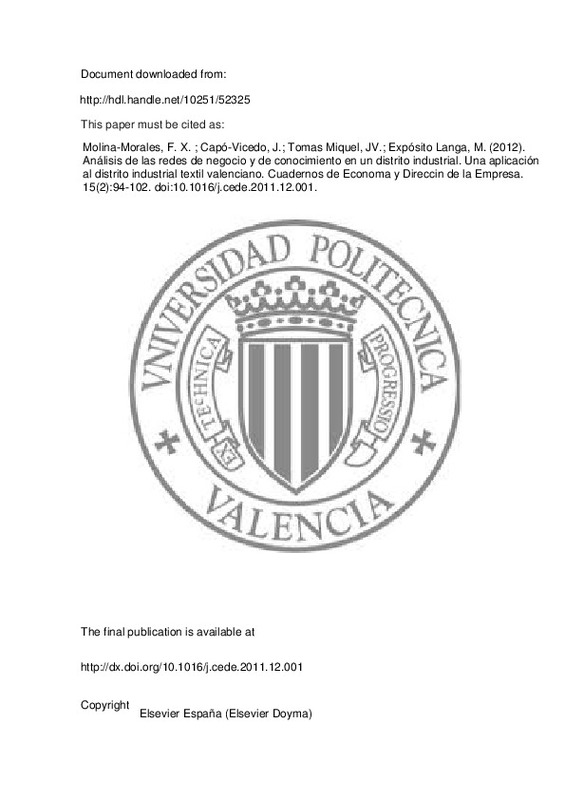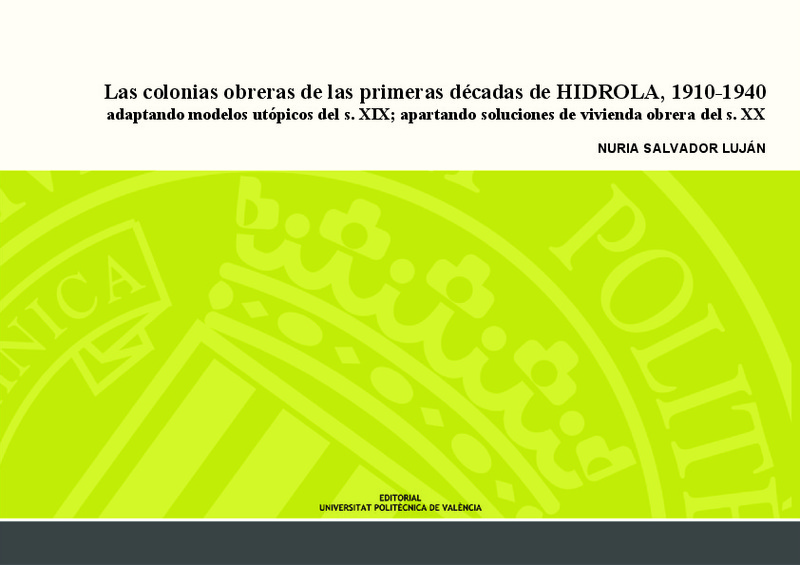JavaScript is disabled for your browser. Some features of this site may not work without it.
Buscar en RiuNet
Listar
Mi cuenta
Estadísticas
Ayuda RiuNet
Admin. UPV
Análisis de las redes de negocio y de conocimiento en un distrito industrial. Una aplicación al distrito industrial textil valenciano
Mostrar el registro sencillo del ítem
Ficheros en el ítem
| dc.contributor.author | Molina Morales, Francesc Xavier
|
es_ES |
| dc.contributor.author | Capó-Vicedo, Josep
|
es_ES |
| dc.contributor.author | Tomas Miquel, Jose Vicente
|
es_ES |
| dc.contributor.author | Expósito Langa, Manuel
|
es_ES |
| dc.date.accessioned | 2015-06-26T06:26:36Z | |
| dc.date.available | 2015-06-26T06:26:36Z | |
| dc.date.issued | 2012-06 | |
| dc.identifier.issn | 1138-5758 | |
| dc.identifier.uri | http://hdl.handle.net/10251/52325 | |
| dc.description.abstract | [EN] Firms belonging to territorial agglomerations such as industrial districts, establish a number of interdependences among them, which provide diverse benefits as access to shared resources. Social networks have been used to represent these interactions in which firms and institutions are embedded. However, firms establish different networks according to the different strategic objectives to be covered. Our study shows the existence of two different types of relational networks: the business network and the knowledge network. This work proves how both networks are significantly different in structural characteristics in terms of density, closeness or intermediation. On the other hand, these networks provide differentiated effects in density and abundance of nodes. These findings offer a better understanding of the internal heterogeneity of these territorial networks and suggest a number of implications for both future research and practitioners. © 2011 ACEDE. | es_ES |
| dc.description.abstract | [ES] Las empresas pertenecientes a aglomeraciones territoriales como un distrito industrial establecen una serie de interdependencias ente ellas que les generan diversos beneficios, como es el caso del acceso a recursos compartidos. Las redes sociales se han utilizado para representar estas interacciones en las que las empresas e instituciones se encuentran inmersas. Sin embargo, las empresas establecen diferentes redes atendiendo a los propósitos estratégicos que traten de cubrir. En nuestro trabajo hemos identificado la presencia de 2 tipos diferentes de redes relacionales: la red de negocio y la red de conocimiento, y mostramos cómo estas 2 redes son significativamente distintas en su caracterización estructural, en términos de densidad, rango, cercanía o intermediación. Por otro lado, las 2 redes presentan efectos diferenciados en la densidad y abundancia de nodos. Estos resultados permiten una mejor compresión de la heterogeneidad interna de estas redes territoriales y sugieren una serie de implicaciones tanto para el mundo académico como para la práctica empresarial. © 2011 ACEDE. Publicado por Elsevier España, S.L. Todos los derechos reservados | es_ES |
| dc.description.sponsorship | Esta investigación ha sido financiada por el Instituto Valenciano de Investigaciones Económicas, en el programa de Ayudas a la Investigación 2010, proyecto «Análisis del capital social desde un enfoque relacional. Una aplicación al distrito industrial valenciano» | |
| dc.language | Español | es_ES |
| dc.publisher | Elsevier España (Elsevier Doyma) | es_ES |
| dc.relation.ispartof | Cuadernos de Economía y Dirección de la Empresa | es_ES |
| dc.rights | Reserva de todos los derechos | es_ES |
| dc.subject | Industrial district | es_ES |
| dc.subject | Social networks | es_ES |
| dc.subject | Textile industry | es_ES |
| dc.subject | Distrito industrial | es_ES |
| dc.subject | Red social | es_ES |
| dc.subject | Industria textil | es_ES |
| dc.subject.classification | ORGANIZACION DE EMPRESAS | es_ES |
| dc.title | Análisis de las redes de negocio y de conocimiento en un distrito industrial. Una aplicación al distrito industrial textil valenciano | es_ES |
| dc.title.alternative | Analysis of business and knowledge networks in an industrial district. An application to the Valencian textile industrial district | es_ES |
| dc.type | Artículo | es_ES |
| dc.identifier.doi | 10.1016/j.cede.2011.12.001 | |
| dc.rights.accessRights | Abierto | es_ES |
| dc.contributor.affiliation | Universitat Politècnica de València. Instituto de Gestión de la Innovación y del Conocimiento - Institut de Gestió de la Innovació i del Coneixement | es_ES |
| dc.contributor.affiliation | Universitat Politècnica de València. Departamento de Organización de Empresas - Departament d'Organització d'Empreses | es_ES |
| dc.description.bibliographicCitation | Molina Morales, FX.; Capó-Vicedo, J.; Tomas Miquel, JV.; Expósito Langa, M. (2012). Análisis de las redes de negocio y de conocimiento en un distrito industrial. Una aplicación al distrito industrial textil valenciano. Cuadernos de Economía y Dirección de la Empresa. 15(2):94-102. doi:10.1016/j.cede.2011.12.001 | es_ES |
| dc.description.accrualMethod | S | es_ES |
| dc.relation.publisherversion | http://dx.doi.org/10.1016/j.cede.2011.12.001 | es_ES |
| dc.description.upvformatpinicio | 94 | es_ES |
| dc.description.upvformatpfin | 102 | es_ES |
| dc.type.version | info:eu-repo/semantics/publishedVersion | es_ES |
| dc.description.volume | 15 | es_ES |
| dc.description.issue | 2 | es_ES |
| dc.relation.senia | 225823 | |
| dc.contributor.funder | Instituto Valenciano de Investigaciones Económicas |







![[Cerrado]](/themes/UPV/images/candado.png)


